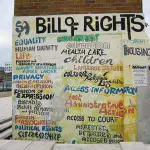
Protecting rights in South Africa is a complex task, due to the nation’s difficult history of colonial rule, social division and human rights abuses. Colonised first by the Dutch and later the English, for decades South Africa was ruled by a white minority regime that excluded native Africans from government, elections, education and the professional classes. In 1948 the Afrikaner-based Nationalist government developed a system of laws called apartheid (‘apartness’ or ‘separation’) which further marginalised black Africans. Under apartheid, black South Africans were relegated to the roles of cheap industrial labour or domestic workers. They had no effective voting rights; they could not settle freely or move around their country without an internal passbook; they had access to scarcely resourced education and healthcare facilities. Many were forcibly relocated to government-designated ‘homelands’, where they lived in impoverished townships or tenement camps. Public facilities and amenities – such as restaurants, stores, taps, toilets, park benches, bridges, footpaths and beaches – were also segregated, designated either for ‘Europeans’ or ‘Blacks’.
From the 1960s native Africans began to struggle, both peacefully and violently, against the white regime and its apartheid laws. Leaders like Nelson Mandela were captured, tried and imprisoned; others, such as Steve Biko, died at the hands of the police or armed forces. As the black struggle for equality and rights intensified, the response of the white regime became even more brutal. By the late 1980s, South Africa was a country on the verge of civil war. Negotiations for a power-sharing arrangement between blacks and whites, the ‘winding back’ of apartheid and the release of Nelson Mandela restored some order to South Africa. In 1994 black South Africans participated for the first time in a national election; Mandela and his party, the African National Congress, were swept to power. After much deliberation, South Africa adopted its first post-apartheid constitution in 1996. Unsurprisingly, South Africa’s new leaders insisted on a constitution with a comprehensive set of rights, so that the division and repression of apartheid could never again reappear.
Like most entrenched laws, South Africa’s constitution cannot be amended by the usual legislative process. Proposed changes must be approved by a two-thirds majority of the South African parliament, as well as two-thirds of South Africa’s nine provinces. Chapter Two of the constitution contains a bill of rights. With 35 sections, it is one of the most extensive entrenched bills of rights in the world. Given South Africa’s historical background it is no surprise that equality, political and legal rights feature strongly in the list. But some of the other express rights, such as the freedom of trade and occupation, are unique to the South African constitution:
- All individuals are equal before the law and have the right to equal life, dignity and equal treatment.
- The bill of rights protects freedom from slavery, servitude and forced labour.
- The right to association and peaceful assembly, demonstrations and petitioning.
- Freedom of personal, political, artistic or academic expression, including freedom of the press and the media; this is limited in that it does not extend to the promotion of war or violence, or the circulation of racist, sexist or otherwise discriminatory views.
- Freedom of privacy (“…everyone has the right to privacy, which includes the right not to have their person or home searched; their property searched; their possessions seized; or the privacy of their communications infringed”).
- Freedom of trade and occupation, again a rarity in a bill of rights, allowing individuals to choose their own career or profession.
- The right to join a trade union, to fair labour practices and to strike.
- The right to live in an environment that is not harmful or dangerous; the right to housing, healthcare, food, water and social security.
- The right to education and to practice and protect one’s own language and culture (South Africa has eleven official languages and numerous tribal groups.
- A section containing a set of enhanced rights specifically for children, such the right to parental or family care and freedom from forced labour or exploitation.
The South African parliament is expected to be mindful of these rights when drafting and passing legislation. Courts, tribunals and government agencies must take the Bill of Rights into account when forming rulings or decisions. Individuals may apply to the courts if they believe their rights have been infringed. They can also lodge a complaint with the South African Human Rights Commission, an independent agency that investigates and takes action on claims of human rights abuses. The Constitutional Court of South Africa can declare legislation to be invalid if the court believes it breaches any of these rights – these rulings cannot be overturned by the parliament.
© lawgovpol.com 2014. Content on this page may not be republished or distributed without permission. For more information please refer to our Terms of Use.
